
There are few, if any, sports broadcasters who will ever match colorful Bay Area legend Bill King. King had some of sports most memorable calls in some of sports most stunning moments. So I’ll borrow from him to describe the San Jose Sharks comeback win over the Vegas Golden knights.
“The most zany, unbelievable, improbable, absolutely impossible dream … There’s nothing real in the world anymore.”
Oakland Raiders announcer Bill King calling the ‘holy roller’ play.
To describe Game 7 of the series between the Sharks and Golden Knights, there is simply no improving on King’s words.
Describing Game 7
The anticipation level for Game 7 of the playoff series was plenty high. But even the highest expectations didn’t match what was about to happen.
Joe Thornton, whose played plenty of NHL hockey in his 21-season career called it “the best game I’ve ever been a part of.”
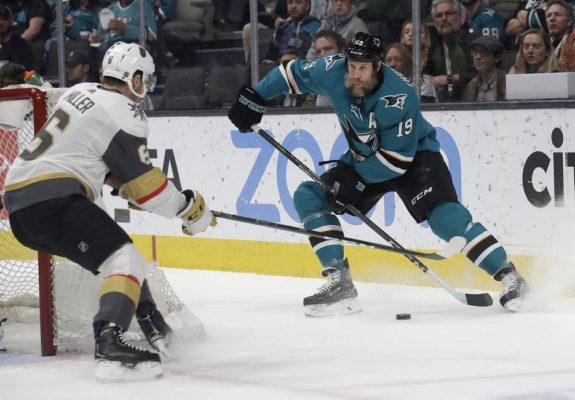
Sharks head coach Peter DeBoer used slightly different words, calling it “the craziest game I’ve ever seen.”
Ken Daneyko on the NHL network said ‘Maybe the best game we’ve seen in 20, 30 years as far as dramatic … crazy.”
If you expect me to make sense of it all, well, I’ll just refer you back to King.
The Sharks-Golden Knights Series
The Sharks looked down and out in this series after Game 4, trailing three games to one following a 5-0 shutout. It marked the Sharks’ third consecutive loss, allowing at least five goals in each game. Full confession, I was among those holding a bleak outlook.
The Sharks rebounded with an inexplicable and strong Game 5; it turned out inexplicable was just warming up. The Game 5 shocker was Martin Jones. Jones had been pulled twice in the three losses. In the one game he played the whole way, he allowed six goals. In the three consecutive losses, his goals-against average per 60 minutes was a staggering 7.6. If there was a saving grace, he wasn’t getting overworked, since he didn’t make it into the second period twice in the three games.
DeBoer shocked many by sticking with Jones and he was good in Game 5, playing a strong game. He was at his best in a the big moments, making a spectacular save with the Sharks nursing a one goal lead and only seven minutes left in regulation.
Martin Jones Steals Game 6
Jones was even better in Game 6. The Golden Knights dominated the ice, but the Sharks were savvy defensively, not allowing many high danger scoring chances. On the few dangerous chances the Golden Knights had, Jones was up to the task.
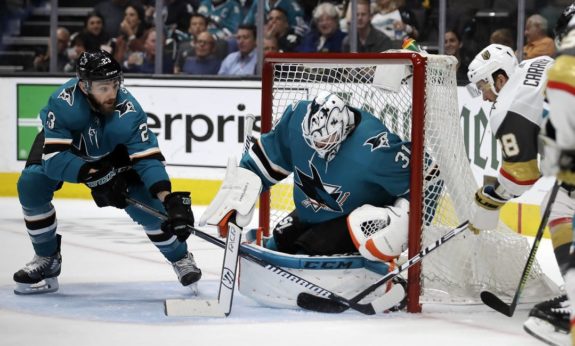
Vegas was better through two periods, but they dominated after, outshooting the Sharks 32-13 from the start of the third period to the end of the game. At the end of regulation, though, the score was tied 1-1 and overtime followed. Neither team scored in overtime and so double overtime was necessary. In the double overtime, Vegas was so dominant the Sharks failed to put a shot on goal for the first half of the session.
With 9:14 left, the Sharks’ Barclay Goodrow got called for slashing. It was the first penalty in overtime, leaving the Sharks to dodge a huge bullet. Vegas had been money on the power play all series, but not this time.
Instead, Tomas Hertl and Brent Burns harassed the Vegas puck handlers at the point, forcing a turnover. Marc-Edouard Vlasic fired a tape-to-tape pass up to an exhausted Hertl who took on Shea Theodore 1-on-1. Hertl considered dumping the puck and getting off the ice, but decided to shoot instead. Good call. It was the Sharks first shot-on-goal in nearly 15 minutes, the last shot of the game and the game winner. Hertl recorded the first short-handed winner in double overtime in NHL history.
In most playoff series, Game 6 would be the classic game everyone remembers. Not in this series.
Sharks & Golden Knights Mind-Boggling Game 7
If Game 6 was classic, well, Game 7 was more. Way more. The play between the teams was relatively even, but Vegas was better at capitalizing on their opportunities and built up a 2-0 lead after two periods. The second goal was controversial, a Cody Eakin high tip which the officials chose not to overturn. It wouldn’t be Eakin’s last controversial moment.
Jones played well, but Marc-Andre Fleury was better. The lead went to 3-0 on a Max Pacioretty score with 16:24 left in regulation, the lone goal Jones probably should have stopped. With the Sharks unable to close the gap over the next several minutes, the end seemed near.
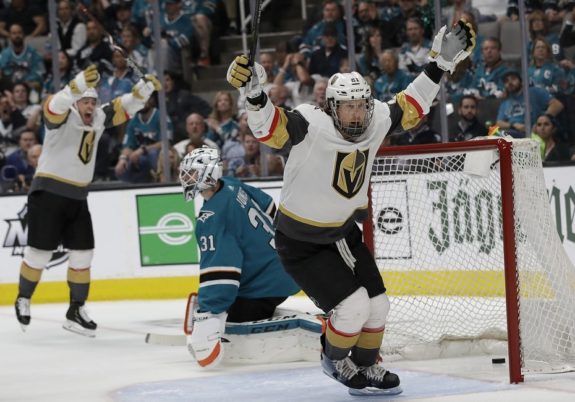
The game turned on a gut-wrenching moment and yet another controversial call in a series which had more than its share. With 10:54 remaining and a faceoff to the left of Fleury, Eakin cross-checked Joe Pavelski up high, though not in the face. Pavelski fell back into Paul Stastny, who drove Pavelski into the ice.
Pavelski began the playoff series taking a puck off his jaw in the opening game, losing several teeth and scoring a goal in the process. He series ended with the combination hit from Eakin and Stastny. For many moments, Pavelski lay motionless on the ice as blood pooled next to his head. He was eventually helped off the ice, a towel trying to stem the bleeding. The game paused while staff attempted (with less than complete success) to scrape the blood from the ice. Mentally, everybody paused.
The Penalty Call
A penalty was called against Eakin and the call has critics, and the criticisms have merit. Eakin did cross-check Pavelski, but it was the contact with Stastny that led to the damage. There was plenty of chippiness all series, but Stastny’s intent is not obvious. Perhaps he simply wanted to power through an off-balanced Pavelski to get to a position on the ice. Perhaps he intended to drive Pavelski into the ice. Either explanation can find video evidence to support it. The result, though, was violent and scary. No doubt, seeing the player motionless and bleeding profusely weighed on the officials.
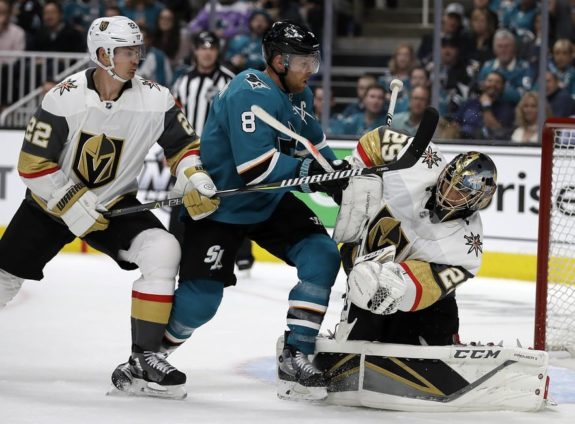
Ultimately, the call went against Eakin, a five-minute major penalty and removal from the game.
The Major Power Play
It is one thing to get a call, another to take full advantage. And the Sharks’ power play, lifeless much of the series, came to life in a massive way.
The Sharks scored their first power-play goal just six seconds into it, with Logan Couture scoring from the left circle (an area where the Sharks scored a number of their goals). Less than a minute later, Tomas Hertl, easily the Sharks best player in the series, tipped home an Erik Karlsson shot-pass to bring the Sharks within a goal.
Couture struck again, from only a few feet away from he earned his first tally, to tie the game with just over seven minutes remaining. A half minute later, the Sharks took the lead. For the fourth time on the power play in a span of four minutes, the Sharks scored. This time, it was Kevin Labanc, who wired a shot from the right face-off dot past Fleury. It was Labanc’s fourth point on the power play, earning him a strange spot in NHL history, the player scoring four points in the shortest time in playoff history (4:01).
The Golden Knights Respond
If the Golden Knights were stunned, they managed to shake it off and they pushed play down the stretch. On a lengthy Vegas possession, Labanc was called for hooking and with 3:41 remaining, Vegas had a chance.
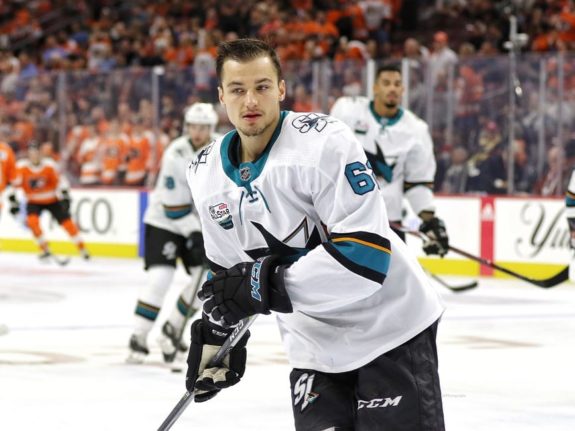
In the waning seconds of the power play. the Golden Knights pulled Fleury for the extra attacker. While the power play expired, the team continued their strong push. Inside the final minute, Reilly Smith went behind the net and found Jonathan Marchessault out front who fired home the tying goal with just 47 seconds left.
Overtime Again
In attempting the comeback, DeBoer shortened his bench. Defenseman Brenden Dillon (just 9:46 of ice time) and forward Lukas Radil (2:36) were stapled to the bench. Goodrow was played sparingly (7:26) and Pavelski was out. The Sharks pushed their stars into bigger minutes in Game 6 than Vegas did. But if the Sharks were tired in Game 7’s overtime, it didn’t show. Forward Timo Meier dominated the period, with several high quality chances, while both goalies made tough, key saves.
In the end, the fresh legs of Goodrow proved decisive. With two minutes left in the overtime, Erik Karlsson made a crafty zone entry, then a terrific touch pass to Goodrow, who used his momentum to go around Vegas defenseman Brayden McNabb. Goodrow found himself behind the defense, crossed in front of Fleury and put it in the back of the net to end one of the most frenzied games in NHL history.
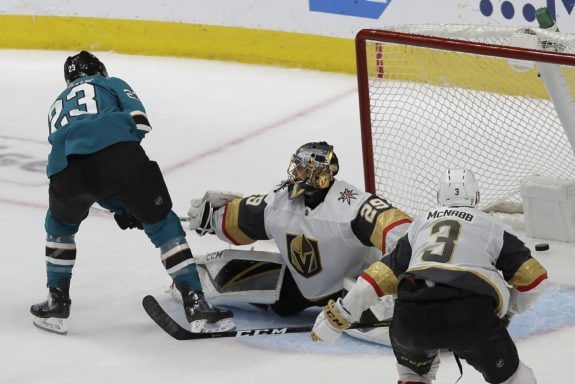
Sharks Explanations
Is there a good explanation for the sudden turnaround in Jones’ game in the series’ final three games? Not really. How did Erik Karlsson, severely compromised in his skating in the middle of the series, suddenly get a good bit healthier? I got nothing. Was anyone expecting the Sharks to capture a game with the first short-handed score in double overtime in league history? If so, it wasn’t me. Did anyone expect Labanc to set an NHL record for the fastest four points or Goodrow to play the series hero? I still got nothing.
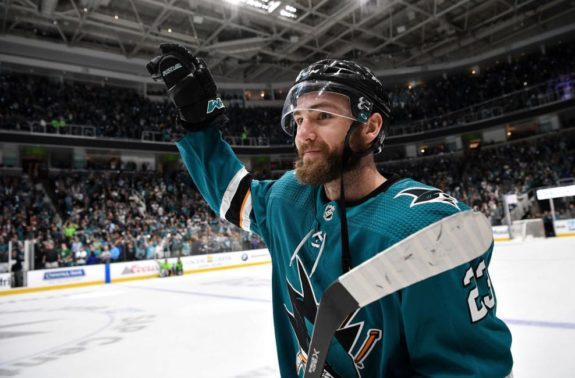
For the Sharks to dig out of a 3-1 series deficit is remarkable. Vegas is a superb team. Even before the series started, I believed the winner of this series had a very good chance of getting the big prize in June. Nothing has changed my mind, though the Sharks could use improved health to better their chances. Certainly, one hopes Pavelski, whether he is able to return or not to the playoffs, recovers fully and quickly.
In the end, the story is one of remarkable perseverance and the Sharks deserve enormous credit for finding ways to win the series. How it happened defies any rational explanation. And while NHL playoff hockey is often tough on rational thinking, this series took it to a whole new level. No doubt, it was “The most zany, unbelievable, improbable, absolutely impossible dream … There’s nothing real in the world anymore.”
Zeke’s Notes
• So many game and series issues to discuss. One is the officiating. Many wondered if the controversial call overturning a Sharks go-ahead goal in game 2 coupled with awarding Vegas a power play would prove the series changing moment. It absolutely changed the game. The second Vegas goal in Game 7 was not overturned, though it did appear to go in off a high touch by Eakin, later the key player in the controversial penalty. Both teams had reasons to be frustrated by the officiating over the course of the series, something noted early and often.
• One area for the league to look into with the officiating are holding calls behind the play. By holding defending players from getting up ice, it creates more time and space for an attack. In one game during the series, Ryan Reeves held up Timo Meier for 12 (!) seconds, and Vegas scored on the play. Meier’s inability to get back into the play likely made a difference on the goal (though not in the game, as Vegas won big). On the Golden Knights best scoring chance in overtime in Game 7, another Sharks player was held up (in this case, his stick) and unable to leave the defensive zone in a timely manner as a result. The added time and space allowed Vegas a dangerous scoring chance.
• At the outset, I said Tomas Hertl was the one player Vegas had no answer for and indeed, they had no answer. Hertl totaled eight points and scored six goals, receiving a star in the Sharks final three wins in the series (he had a goal and an assist in the lone Sharks win he didn’t get a star).
• Brent Burns played an understated series, but he was good at both ends. I’ve said he covers an enormous amount of ice and he did, despite averaging over 30 minutes a game. Though he made mistakes, he freqeuntly frustrated the Vegas attack, often single-handedly. Marc-Edouard Vlasic continued to show his value, the Sharks outscored Vegas 20-12 with Vlasic in the line-up and were outscored 13-3 when he was out.
• Joakim Ryan, the Sharks defenseman, often found in DeBoer’s doghouse instead of on the ice, was challenged to keep up with play at times in the series. But he battled hard and in the end, deserves props. He finished the series with 69 minutes of ice time, a pretty meager total for a series which totaled 470 minutes of game action. Vegas scored 25 goals in the series, but none with Ryan on the ice.